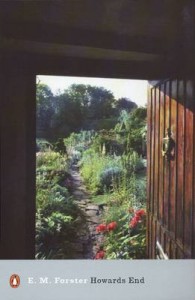 I was recently watching a British talk show panel discuss British identity: what does it mean to be British in 2014? They concluded that British identity could not be – indeed, should not be – reduced to the old qualifiers of bowler hats and afternoon tea. Being British meant being tolerant, inclusive, proud of the cultural pastiche that is London, and all those other feel-good adjectives associated with, to quote from Roth’s Mickey Sabbath, “the laudable ideologies” (no coincidence, incidentally, that the full quote is “Fuck the laudable ideologies”). And then I read E.M. Forster’s beloved Howards End, a quintessentially British novel if ever there was one, and I felt a profound sadness. Forster knows what today only the politically incorrect avow: that there is indeed a British identity, one entwined with tricky questions of history and politics, manners and mannerisms and social strata, and that while acknowledging this is not tantamount to approving of it uncritically, denying it is so disingenuous as to disqualify you from the discussion.
I was recently watching a British talk show panel discuss British identity: what does it mean to be British in 2014? They concluded that British identity could not be – indeed, should not be – reduced to the old qualifiers of bowler hats and afternoon tea. Being British meant being tolerant, inclusive, proud of the cultural pastiche that is London, and all those other feel-good adjectives associated with, to quote from Roth’s Mickey Sabbath, “the laudable ideologies” (no coincidence, incidentally, that the full quote is “Fuck the laudable ideologies”). And then I read E.M. Forster’s beloved Howards End, a quintessentially British novel if ever there was one, and I felt a profound sadness. Forster knows what today only the politically incorrect avow: that there is indeed a British identity, one entwined with tricky questions of history and politics, manners and mannerisms and social strata, and that while acknowledging this is not tantamount to approving of it uncritically, denying it is so disingenuous as to disqualify you from the discussion.
These questions of identity are very much central to Forster’s novel. His protagonists are Margaret, Helen and Tibby Schlegel, British orphans of German descent who, though very well-to-do, feel themselves to be on the fringes of society. Their fates are intertwined with the Wilcoxes – whose paterfamilias is a successful businessman with extremely traditional views (including an opposition to women’s suffrage) – and the Basts, a young and unlikely couple scraping together a living. This is, in part, a comedy of manners, with the confrontations between Schlegels, Basts and Wilcoxes providing ample fodder for Forster’s wit, but the novel manages to display a quiet reverence for all that it mocks. Even Mr. Wilcox, an egoist, adulterer and hypocrite, somehow emerges sympathetic under Forster’s deft touch.
The novel’s emotional center is Margaret, eldest of the Schlegel orphans, whose plain looks and family duties have kept her single longer than custom and propriety normally allow. She may be one of the most quietly heroic characters I have ever encountered, exercising an unusual combination of restraint, diplomacy and forgiveness, not to mention incredible cunning, to manage the volatile personalities of friends and family.
In truth, my understanding of this book is unequal to my admiration for it, an embarrassing thing to have to confess. Forster is not a difficult writer and this is not a difficult book, but his artistry is so seamless, so effortless, that it’s difficult to dissect. This is a thoroughly delightful book, which is to say that it is funny and engaging, and there exists a longstanding prejudice against art that is so unapologetically entertaining, a prejudice that has damaged Forster’s reputation in the highest circles of literary criticism. And yet, in Howards End, Forster has preserved in amber an entire society, its manners and its mores, its prejudices and insecurities. The result is captivating.